

 "Two days overdue, THE WORLD'S WORK has not reached me. Pray make a note of this. I would rather not have to resort to violence" - quoted in THE WORLD'S WORK, 1910 |
Dave Thomson |
What work I have done I have done because it has been play. If it had been work I shouldn't have done it. Who was it who said, "Blessed is the man who has found his work"?
Whoever it was he had the right idea in his mind. Mark you, he says his
work--not somebody else's work. The work that is really a man's own work
is play and not work at all. Cursed is the man who has found some other
man's work and cannot lose it. When we talk about the great workers of
the world we really mean the great players of the world. The fellows who
groan and sweat under the weary load of toil that they bear never can
hope to do anything great. How can they when their souls are in a ferment
of revolt against the employment of their hands and brains? The product
of slavery, intellectual or physical, can never be great. |
Work consists of whatever a body is obliged to do. Play consists of whatever
a body is not obliged to do.
- The Adventures of Tom Sawyer
The bane of Americans is overwork--and the ruin of any work is a divided interest.
Concentrate-concentrate. One thing at a time.
-Letter to Orion Clemens, 12 May 1880
In America, we hurry--which is well; but when the day's work is done, we go
on thinking of losses and gains, we plan for the morrow, we even carry our business
cares to bed with us...we burn up our energies with these excitements, and either
die early or drop into a lean and mean old age at a time of life which they
call a man's prime in Europe...What a robust people, what a nation of thinkers
we might be, if we would only lay ourselves on the shelf occasionally and renew
our edges!
- The Innocents Abroad
Only Bunyan, Sir Walter Raleigh, the author of Don Quixote, & a few other
people have had the best of opportunties for working, in this world. Solitary
imprisonment, by compulsion, is the one perfect condition for perfect performance
... Then his work becomes his pleasure, his recreation, his absorption, his
uplifting & all-satisfying enthusiasm. He is miserable only when the work-day
closes. And yet a man so circumstanced need never be actually miserable; for
he can weave his fancies & continue his work in his head until sleep overtakes
him. He lives in a fairer world than any that is outside, he moves in a goodlier
company than any that others know, & over them he is king & then obey
him.
- Letter to Mary Mason Fairbanks, 6 August 1877
There are wise people who talk ever so knowingly and complacently about "the
working classes," and satisfy themselves that a day's hard intellectual
work is very much harder than a day's hard manual toil, and is righteously entitled
to much bigger pay. Why, they really think that, you know, because they all
know about the one, but haven't tried the other. But I know all about both;
and as far as I am concerned, there isn't money enough in the universe to hire
me to swing a pickaxe thirty days, but I will do the hardest kind of intellectual
work for just as near nothing as you can cipher it down--and I will be satisfied,
too. Intellectual "work" is misnamed; it is a pleasure, a dissipation
and its own highest reward. The poorest paid architect, engineer, general, author,
sculptor, painter, lecturer, advocate, legislator, actor, preacher, singer,
is constructively in heaven when he is at work; and as for the magician with
the fiddle-bow in his hand who sits in the midst of a great orchestra with the
ebbing and flowing tides of divine sound washing over him--why certainly, he
is at work, if you wish to call it that, but lord, it's a sarcasm just the same.
The law of work does seem utterly unfair--but there it is, and nothing can change
it: the higher the pay in enjoyment the worker gets out of it, the higher shall
be his pay in cash, also. And it's also the very law of those transparent swindles,
transmissible nobility and kingship.
- A Connecticut Yankee in King Arthur's Court
Quotations | Newspaper Articles | Special Features | Links | Search